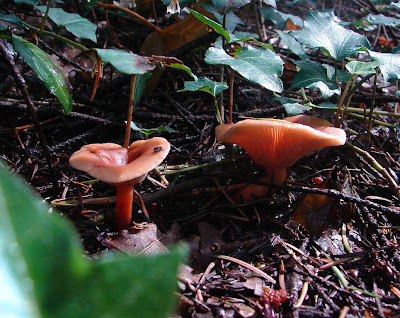
There were lots of fungi in the woods at Stover on Saturday. This is the Common Yellow Russula (Russula ochroleuca) - one of the few species I could identify straight off.

I think this is a Cortinarius species - possibly C. bulbosus.

Another species that I was reasonably sure of - Lactarius hepaticus, the Liver Milk-cap.

These seemed too small to be Destroying Angels (Amanita virosa) but I certainly wouldn't try eating one to check! It could be Inocybe geophylla - the Common White Fibre-cap - but that is poisonous as well!

This could be a Death Cap (Amanita phalloides) which is a very variable fungus but the ring seems a little low down the stem. Again, I don't think I'd try eating it to see.

"Oh Look, there's a fish!"

Ian pretending to feed the ducks. The ducks kept looking for the non-existent food!

In one spot there were lots of Squash bugs (Coreus marginatus) on the vegetation.

This is a Squash Bug nymph.

Hemp Agrimony, one of the many flowers that were attracting hoverflies.

Gipsywort, a non-aromatic member of the Mint family.

Helen found a Common Lizard.

A Common Darter.

Ian was studying the oak trees.

This is Lochmaea caprea. Although known as the Willow Leaf Beetle this one was on Alder.

Another leaf beetle - Chrysolna rufa.

A juvenile Cormorant.

My first ever Water Rail. Not a brilliant picture but an exciting event.

A female Brimstone butterfly posed nicely for us.
1 comment:
I came across this, while looking for images for Coreus marginatus. The picture you say depicts a nymph of a squash bug, in fact doesn't. The animal in the picture is an adult bug of the genus Eurygaster (I'm not sure about the species, maybe Eurygaster maura)
Post a Comment